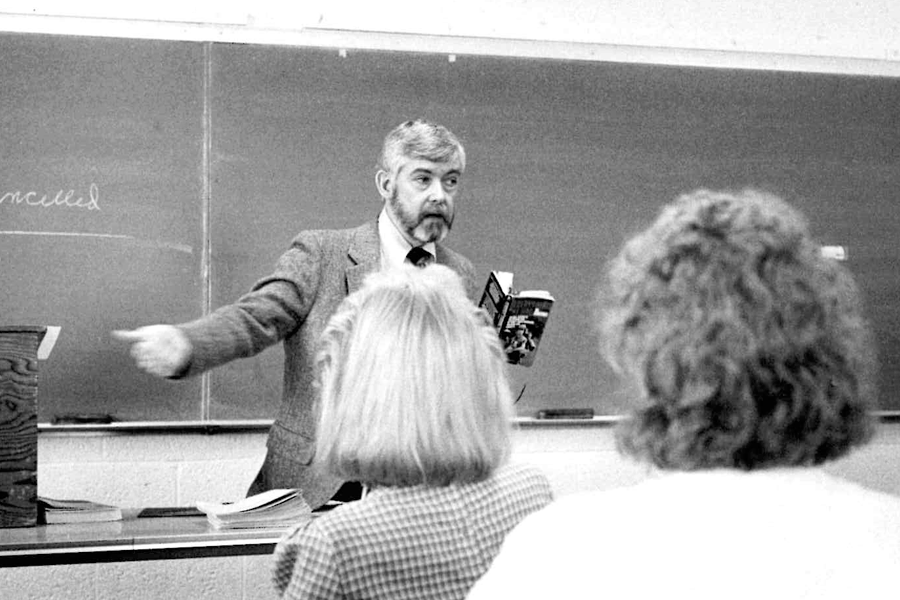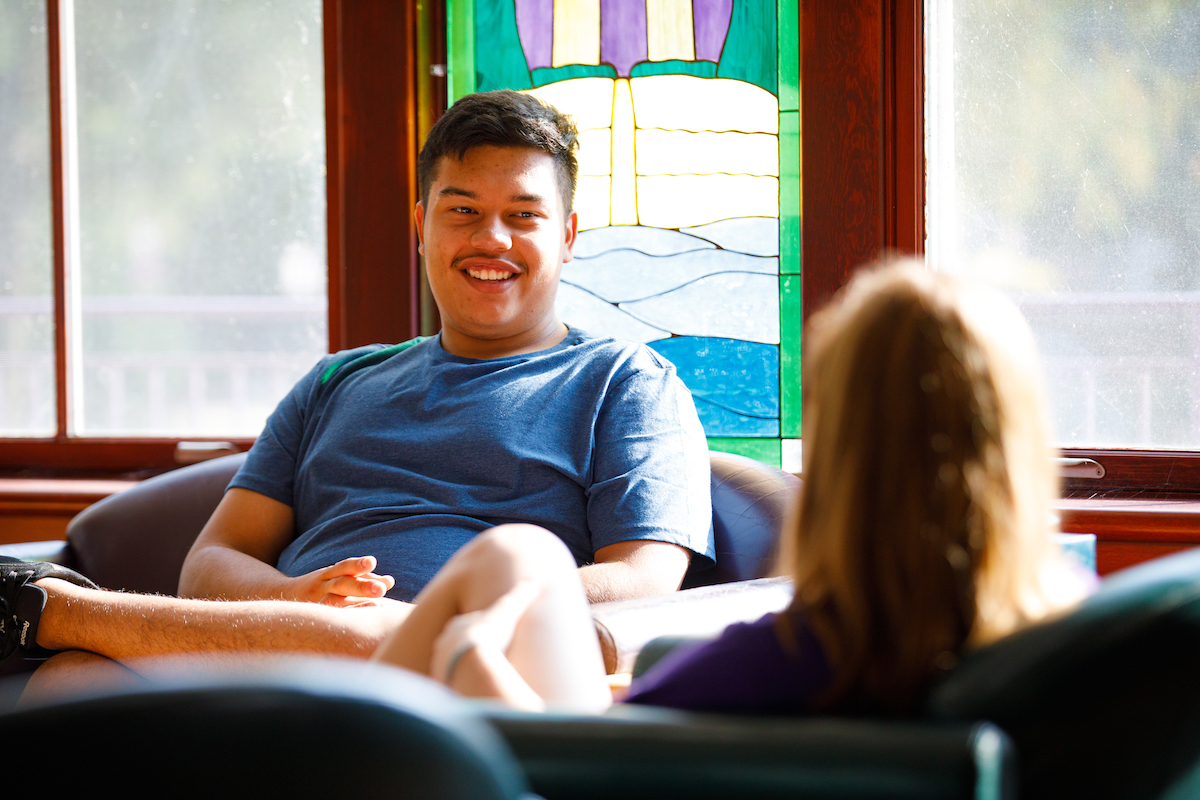Albion Mourns Loss of Philosophy Professor Ralph Davis
Related Programs
Related Posts
Connect With Us
“Uncle Ralph” provoked discussion, protected students with ‘radical acceptance’ of their humanity.
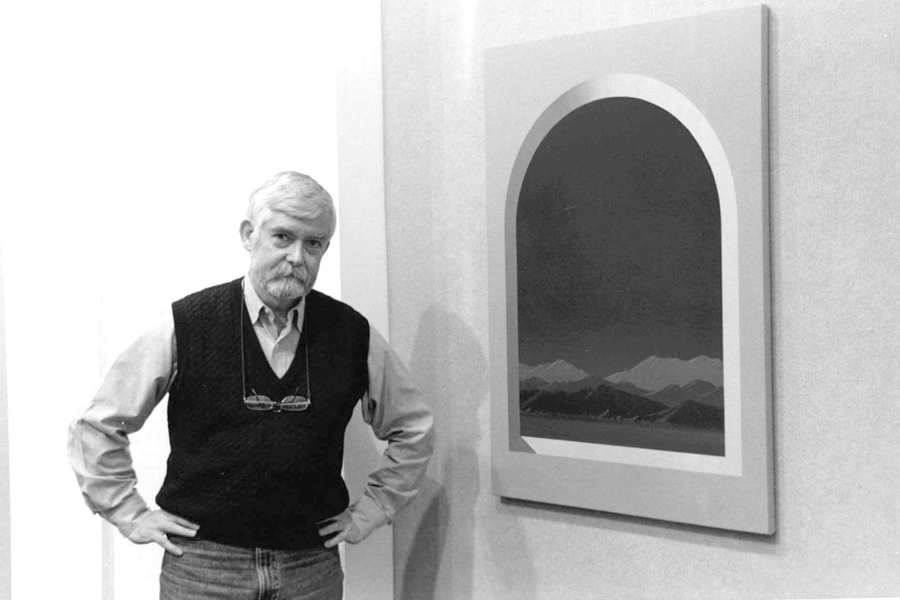
By Jake Weber
Philosophy professor emeritus Ralph Davis passed away Feb. 8 in Portland, OR at the age of 81. He is survived by Margaret, his wife of 55 years, two children and one grandchild.
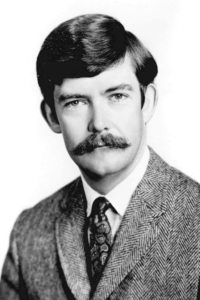
In 1967, through a fellowship from the National Endowment for the Humanities, Albion offered a two-year contract to Davis to help build the College’s Great Ideas Program. Through the next 38 years, Davis became the first director of that program, then the first director of its successor, the Prentiss M. Brown Honors Institute. Shortly before his retirement, Davis also received the first Prentiss M. Brown Honors Institute professorship.
An “ordinary language” philosopher with a serious side hustle as an artist, Davis embraced and exemplified a liberal arts experience. Along with teaching numerous courses for the Great Ideas and Honors programs, Davis taught philosophy courses and co-taught interdisciplinary courses with colleagues across campus.
I was a fan,” said Amy Weinmeister Rahn, ’05, “I had a pet fish I named after him!” She recalled that Davis “was a gifted storyteller with a natural way of leading a conversation to an unlikely result. You could do all the reading but that was just the beginning; the conversation would deepen and turn your understanding. You never knew what you were going to learn.”
Her classroom experiences with Davis have also informed Rahn’s work today, as an art history professor at the University of Maine-Augusta. “He was a really good listener; he could listen to what students said and used their comments to build a conversation,” Rahn concluded. “I try to listen like that with my own students.”
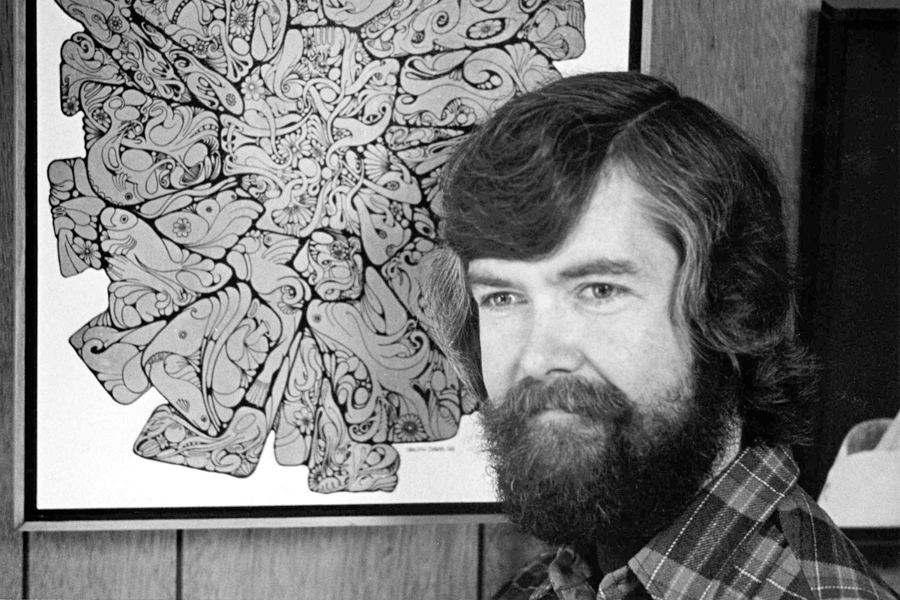
Jason Kennedy, ’04, is another of Davis’ students who joined academia, in his case as senior lecturer in animation, visual effects and game design at Auckland University of Technology. Kennedy took five classes with “Dr. Davis” (he didn’t use the “Uncle Ralph” favored by most students), despite a dismaying start to their relationship.
Coming into Albion, “I considered myself a very good writer. Then on my first assignment, Dr. Davis wrote ‘Jason, you MUST be more careful with your writing”. I was offended, devastated and impressed. Here was someone willing to challenge me… the audacity!,” Kennedy recalled.
Kennedy went on to remember Davis’ excellence in developing Honors students’ ability to think critically about art and science, and noted with pride that one of Davis’ paintings hangs in his Auckland office. “Dr. Davis helped me to chart my way to a university career, and I still use many of the tools he taught me to educate my students,” he said.
Susan Laing, ’02, recalled her senior capstone with Davis. “That course taught me to not take things at face value, to return to original sources, that correlation does not equal causation. It forced me to dissect arguments, even if they seem plausible and understand their anatomy, their values and their flaws. That course tied together the bits and pieces I had gleaned from my philosophy, anthropology and general studies courses.”
That wonderful capstone experience might never have happened for Laing if it hadn’t been for Davis’ reaction to a far less proud moment in Laing’s college career — when she tried to bluff her way through a class discussion. “He looked at me and said, ‘I was hoping you’d say the exact opposite,’” Laing said. “He saw me for what I was that day, an unprepared student, and moved on. His practice of ‘radical acceptance’ helped teach me to get over my fear of saying the wrong thing.”
Philosophy professor emeritus Gene Cline recalled Davis’ delight in sparking provocative conversations with students and colleagues. “His courses were originals with titles such as “Mysticism and Magic,” where he would routinely argue that we have as many good reasons to believe astrology as we do physical science,” Cline explained.
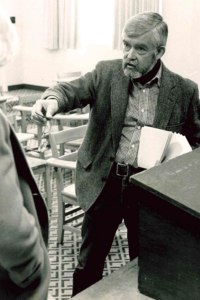 “Ralph took the convergence of scientific disciplines as evidence that there would be few scientific revolutions of the sort that Kuhn describes in The Structure of Scientific Revolutions. He greatly enjoyed poking holes in arguments which he thought claimed too much. There were a lot of those all around campus.”
“Ralph took the convergence of scientific disciplines as evidence that there would be few scientific revolutions of the sort that Kuhn describes in The Structure of Scientific Revolutions. He greatly enjoyed poking holes in arguments which he thought claimed too much. There were a lot of those all around campus.”
Davis’ dry — and sometimes biting — sense of humor was also notorious. “Once, when the powers-that-be again reneged on promised faculty raises Ralph put signs on many of the hot air hand dryers around campus,” Cline said. “They read, ‘Press button for a message from the Board of Trustees.’”
Prior to joining Albion’s faculty, Davis worked as an operative with the U.S. Army Counterintelligence Corps. During his tenure and well into his retirement, Davis regularly taught for the National Science Foundation’s Chautauqua Short Course series. A self-taught painter, Davis exhibited his work for more than 50 years in galleries across the U.S. and in Germany. For decades, he also participated in the Ann Arbor Art Fair, and in retirement, actively exhibited his work in the Portland, OR area.
“We worked well together,” said emeritus professor of art Frank Machek, who taught Philosophy of Art with Davis for many years. The classroom partnership, said Machek, was enhanced by their regular trips together to Chicago and New York, where they scouted field trip sites and studied artists and works they used in their teaching. “I enjoyed teaching the class in large part because of the relationship we developed,” said Machek.
“We were friends and that took place in the classroom as well,” Machek continued. “When one of us was teaching, the other was free to expand on a point or add a different perspective. It was always a ‘back and forth’ and fun, teaching with Ralph.”
“This philosopher encouraged my studies. This Buddhist encouraged my spiritual life. My love of ancient philosophy came from his seminar on “Love and Goodness,” reflected Erin Wakefield Holmes, ’93. “The best teachers don’t make students into carbon copies of themselves, they help their students become their best selves.”
“I didn’t know what to expect,” said Randi Heathman, ’03, of Philosophy of Art, her first course with Davis (and the only art course she ever took). “I certainly didn’t expect that the professor would walk in, look at us over the top of his glasses (a patented Ralph Davis move), and sigh, ‘Well. Let’s see how many of you really want to do this.’ In that moment I wasn’t sure I did.”
Heathman went on to explain that Davis became an “absolute favorite professor — not because he gave me 4.0s and not because the stern exterior simply masked a very (very!) dry sense of humor, but because he made me earn those 4.0s by using my voice. He helped me form opinions about art when I didn’t think I had any — which has probably made me dangerous because now I form opinions about lots of things.”
